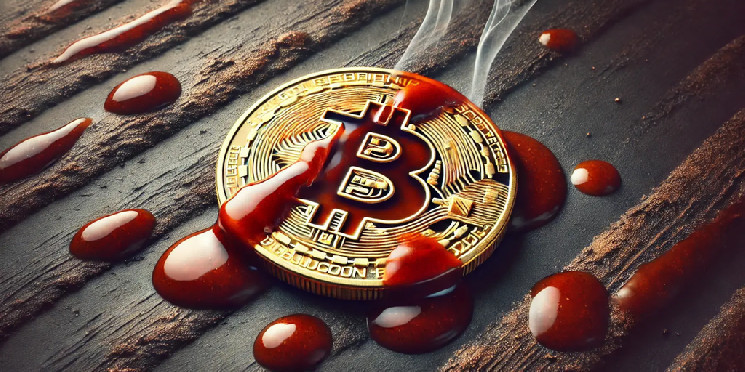Crypto and broader equities fell sharply Wednesday as traders attempted to divine next year’s outlook following a hawkish pivot from the U.S. central bank.
While the 25 basis point cut delivered by the Federal Reserve on Wednesday was largely priced in, concerns flared as the bank signaled interest rates may not go down again anytime soon.
During a press conference, Fed Chair Jerome Powell told reporters that while inflation was “steadily” receding, recent high readings indicated it had been “slower than hoped.”
The Fed’s updated “dot plot” for 2025 has signaled a shift in policy expectations, with officials now projecting two rate cuts—equivalent to 50 basis points—over the next 12 months, down from the three cuts outlined in the previous forecast.
“Inflation has made progress toward the Committee’s 2% objective but remains somewhat elevated,” the Fed said in a statement.
Bitcoin fell 5% to just above $100,000 following Powell’s comments, while the Nasdaq slid 3.6%, the Dow tumbled 2.6%, and the S&P 500 declined nearly 3%.
Risk assets, which include crypto and equities, have soared this year thanks partly to a stabilizing economy as the central bank fights to bring inflation back under control.
But what does this all mean for crypto?
According to Ryan McMillin, chief investment officer at crypto fund manager Merkle Tree Capital, traders should expect and be comfortable with 20% corrections during a bull market.
“I don’t see any reason to think this bull market has run its course just yet,” McMillin told Decrypt. “This looks much more like a dip worth buying.”
The market has been trending higher and consolidating around elevated levels over the past week, signaling a healthy acceptance of the new price range as it stabilizes ahead of a potential further advance, he added.
Others tend to agree.
“I get the hawkish reaction. I don’t buy the narrative that this is the Fed dot plot that ends the bull run,” Pav Hundal, lead analyst at Swyftx, told Decrypt.
President-elect Donald Trump’s proposed tariffs to boost domestic industrial production could drive short-term market volatility next year and stoke inflationary pressures, according to economists.
But according to Hundal, that policy chatter isn’t likely to amount to much in the way of the Fed’s decision to cut rates further or hold them steady.
“It doesn’t even matter if the tariff talk is all bluster; it’s a clear signal that Trump will do whatever it takes to stimulate economic growth, and that is good for risk assets,” he said.

